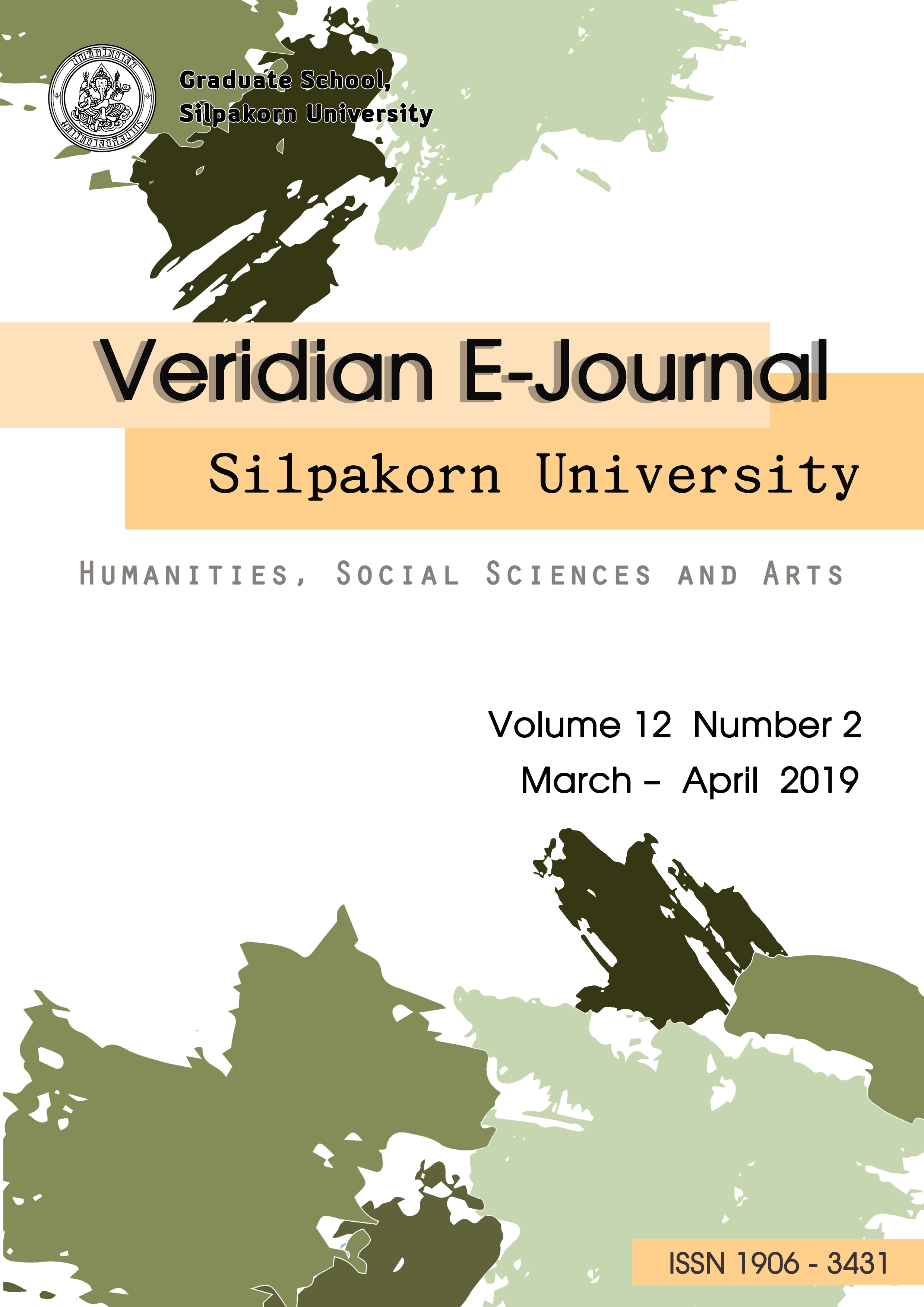ผลกระทบของบุคลิกภาพห้าองค์ประกอบและแรงจูงใจในการมุ่งเน้นเป็นผู้ประกอบการต่อความตั้งใจที่จะเป็นผู้ประกอบการดิจิทัลของกลุ่มคนเจเนอเรชั่นซี (The Effects of Five-Factor Personality and Entrepreneurial Motivation on Digital Entrepreneurial Intention of the Generation Z)
Main Article Content
Abstract
การวิจัยครั้งนี้มีวัตถุประสงค์เพื่อศึกษาถึง 1) ผลกระทบของบุคลิกภาพห้าองค์ประกอบและแรงจูงใจในการมุ่งเน้นเป็นผู้ประกอบการที่มีต่อความตั้งใจที่จะเป็นผู้ประกอบการดิจิทัลของกลุ่มคนเจเนอเรชั่นซี 2) อิทธิพลทางตรง อิทธิพลทางอ้อม และอิทธิพลรวมของบุคลิกภาพห้าองค์ประกอบที่มีต่อแรงจูงใจในการมุ่งเน้นเป็นผู้ประกอบการดิจิทัลของกลุ่มคนเจเนอเรชั่นซี และ 3) อิทธิพลทางตรง อิทธิพลทางอ้อม และอิทธิพลรวมของแรงจูงใจในการมุ่งเน้นเป็นผู้ประกอบการที่มีต่อความตั้งใจที่จะเป็นผู้ประกอบการดิจิทัลของกลุ่มคนเจเนอเรชั่นซีโดยใช้ระเบียบวิธีวิจัยเชิงปริมาณทำการวิจัยเชิงประจักษ์และใช้แบบสอบถามเป็นเครื่องมือในการเก็บรวบรวมข้อมูลจากกลุ่มคนเจเนอเรชั่นซี จำนวน 400 คน จากนั้นทำการวิเคราะห์โมเดลการวัดและวิเคราะห์โมเดลสมการโครงสร้างก่อนการทำการตรวจสอบสมมติฐานด้วยวิธีการวิเคราะห์ข้อมูลสถิติแบบโมเดลสมการโครงสร้างกำลังสองน้อยที่สุดบางส่วน (PLS-SEM) ด้วยโปรแกรมสำเร็จรูป SmartPLS
ผลการวิจัยพบว่า 1) บุคลิกภาพด้านการเปิดเผยตนเองเป็นปัจจัยสำคัญที่สุดที่ส่งผลต่อแรงจูงใจภายในในการมุ่งเน้นเป็นผู้ประกอบการดิจิทัล รองลงมาคือ บุคลิกภาพด้านการเปิดรับประสบการณ์ และบุคลิกภาพด้านความรับผิดชอบ ตามลำดับ โดยบุคลิกภาพด้านความรับผิดชอบเป็นปัจจัยสำคัญที่ส่งผลต่อแรงจูงใจภายนอกในการมุ่งเน้นเป็นผู้ประกอบการดิจิทัลมากที่สุด รองลงมาคือ บุคลิกภาพด้านการเปิดเผยตนเอง นอกจากนี้ แรงจูงใจภายนอกในการมุ่งเน้นเป็นผู้ประกอบการดิจิทัลยังเป็นปัจจัยสำคัญที่ส่งผลต่อความตั้งใจที่จะเป็นผู้ประกอบการดิจิทัลของกลุ่มคนเจเนอเรชั่นซีมากที่สุด รองลงมาคือ แรงจูงใจภายในในการมุ่งเน้นเป็นผู้ประกอบการดิจิทัล ตามลำดับ 2) บุคลิกภาพด้านการเปิดเผยตนเองมีอิทธิพลทางตรงต่อแรงจูงใจภายในในการมุ่งเน้นเป็นผู้ประกอบการดิจิทัลมากที่สุด (DE=0.186, TE=0.186) รองลงมาคือ บุคลิกภาพด้านความรับผิดชอบ (DE=0.150, TE=0.150) และบุคลิกภาพด้านการเปิดรับประสบการณ์ (DE=0.113, TE=0.113) ตามลำดับ นอกจากนี้ บุคลิกภาพด้านความรับผิดชอบยังมีอิทธิพลทางอ้อมต่อความตั้งใจที่จะเป็นผู้ประกอบการดิจิทัล มากที่สุด (IE=0.155, TE=0.155) รองลงมาคือ บุคลิกภาพด้านการเปิดเผยตนเอง (IE=0.127, TE=0.127) และบุคลิกภาพด้านการเปิดรับประสบการณ์ (IE=0.040, TE=0.040) ตามลำดับ โดยบุคลิกภาพด้านความรับผิดชอบยังมีอิทธิพลทางตรงต่อแรงจูงใจภายนอกในการมุ่งเน้นเป็นผู้ประกอบการดิจิทัลมากที่สุด (DE=0.239, TE=0.239) รองลงมาคือ บุคลิกภาพด้านการเปิดเผยตนเอง (DE=0.143, TE=0.143) ตามลำดับ และ3) แรงจูงใจภายนอกในการมุ่งเน้นเป็นผู้ประกอบการดิจิทัลยังมีอิทธิพลทางตรงต่อความตั้งใจที่จะเป็นผู้ประกอบการดิจิทัลของกลุ่มคนเจเนอเรชั่นซีมากที่สุด (DE=0.424, TE=0.424) รองลงมาคือ แรงจูงใจภายนอกในการมุ่งเน้นเป็นผู้ประกอบการดิจิทัล (DE=0.356, TE=0.356) ตามลำดับ
The purposes of this study were to investigate 1) the effects of five-factor personality and entrepreneurial motivation on digital entrepreneurial intention of the generation z; 2) the direct effect, indirect effect and total effect of five-factor personality on entrepreneurial motivation of the generation z; and 3) the direct effect, indirect effect and total effect of entrepreneurial motivation on digital entrepreneurial intention of the generation z. The quantitative survey research method is used for this study and the research tool is a questionnaire to collect data from 400 the generation z as the sample size. Then analysis the measurement model and structural equation modeling before hypotheses testing by Partial Least Square Structural Equation Modeling (PLS-SEM) with SmartPLS software.
The results found that the most factor that have a statistically significant positive effects on intrinsic digital entrepreneurial motivation was the extraversion, conscientiousness and openness to experience, respectively. And conscientiousness was the most factors that have statistically significant positive effects on extrinsic digital entrepreneurial motivation, followed by extraversion. Moreover, the extrinsic digital entrepreneurial motivation was the most factors that have statistically significant positive effects on digital entrepreneurial intention of the generation z and intrinsic digital entrepreneurial motivation, respectively; 2) the extraversion have a statistically significant direct effect on intrinsic digital entrepreneurial motivation (DE=0.186, TE=0.186), followed by conscientiousness (DE=0.150, TE=0.150), and openness to experience (DE=0.113, TE=0.113), respectively. Moreover, the conscientiousness was the most factors that have a statistically significant indirect effect on digital entrepreneurial intention (IE=0.155, TE=0.155), followed by extraversion (IE=0.127, TE=0.127), and openness to experience (IE=0.040, TE=0.040), respectively. Which conscientiousness was the most factors that have a statistically significant direct effect on extrinsic digital entrepreneurial motivation (DE=0.239, TE=0.239), followed by extraversion (DE=0.143, TE=0.143), respectively; and 3) extrinsic digital entrepreneurial motivation was the most factors that have a statistically significant direct effect on digital entrepreneurial intention of the generation z (DE=0.424, TE=0.424), followed by intrinsic digital entrepreneurial motivation (DE=0.356, TE=0.356), respectively.

